Academic Writing: Plagiarism, Citation, Referencing, and Communication
VerifiedAdded on 2022/12/09
|8
|1965
|253
Portfolio
AI Summary
This portfolio delves into crucial aspects of academic writing, offering a detailed overview of plagiarism, citation, paraphrasing, referencing, and quotation. It defines these elements, explaining their importance and providing practical guidance on how to avoid plagiarism, properly cite sources, and effectively integrate external ideas into one's work. The report also covers the significance of note-taking skills, various referencing styles, and common referencing errors. Furthermore, it emphasizes the importance of verbal communication skills, providing strategies for improvement, and explores techniques for enhancing collaborative learning. The report concludes by summarizing the key takeaways and reinforcing the importance of these skills for producing high-quality academic work.
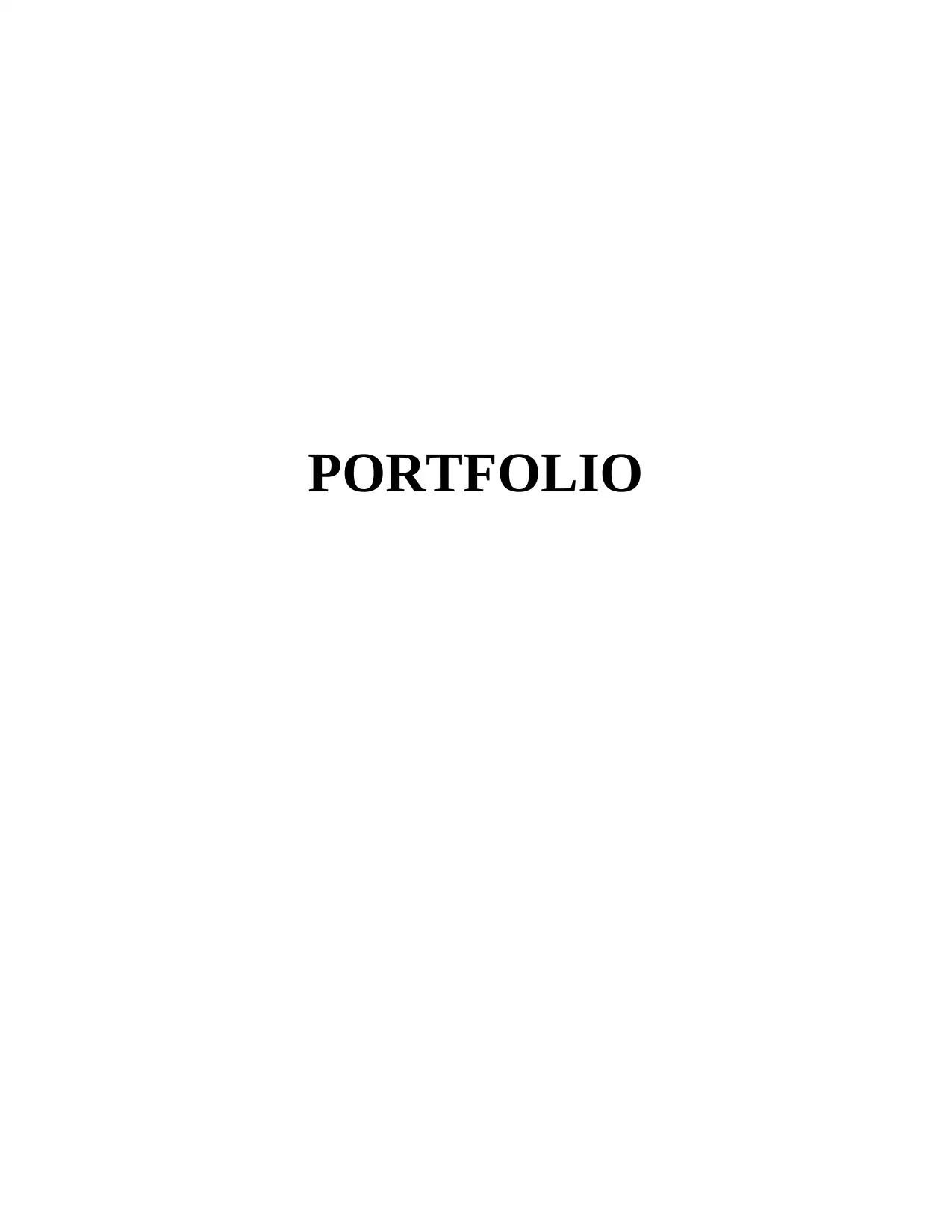
PORTFOLIO
Paraphrase This Document
Need a fresh take? Get an instant paraphrase of this document with our AI Paraphraser
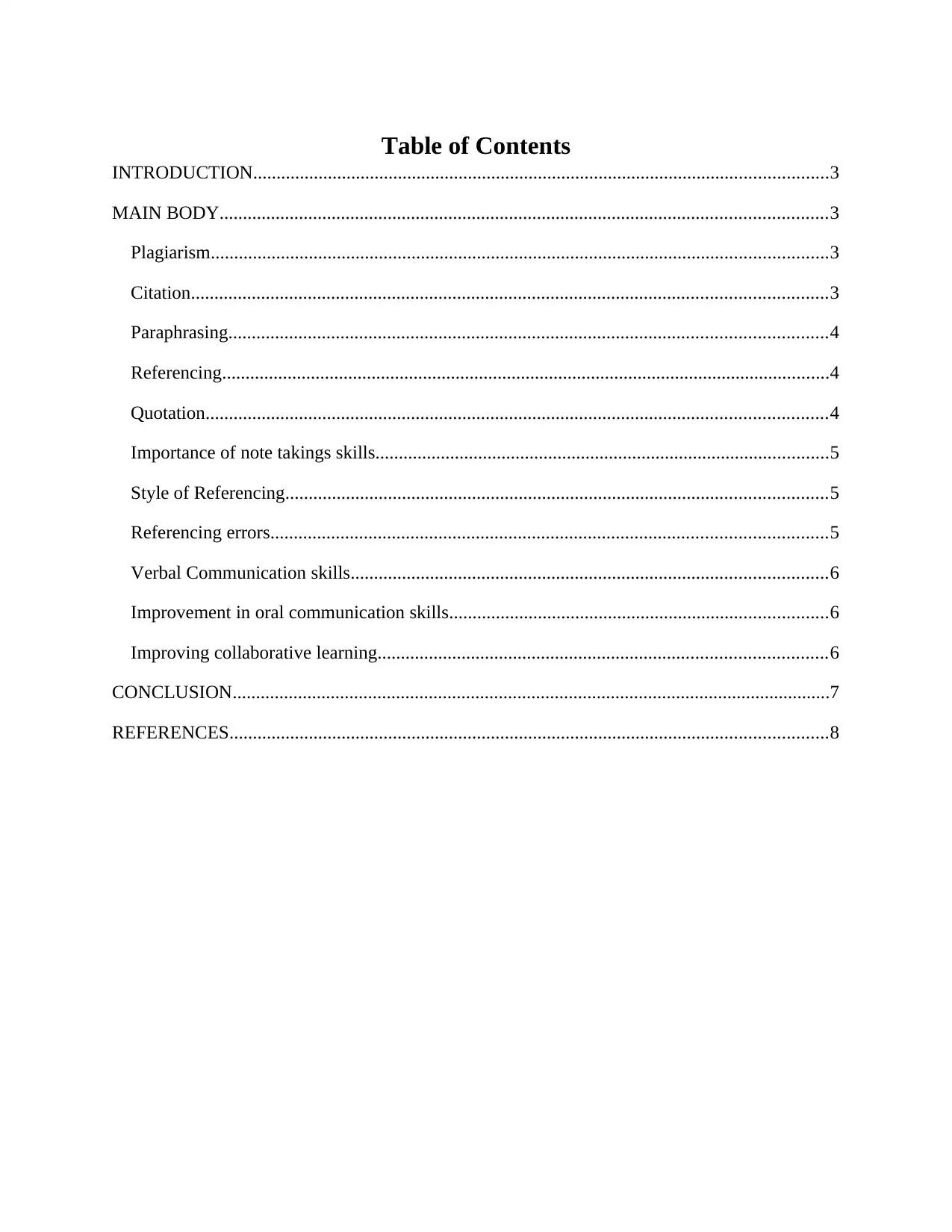
Table of Contents
INTRODUCTION...........................................................................................................................3
MAIN BODY..................................................................................................................................3
Plagiarism....................................................................................................................................3
Citation........................................................................................................................................3
Paraphrasing................................................................................................................................4
Referencing..................................................................................................................................4
Quotation.....................................................................................................................................4
Importance of note takings skills.................................................................................................5
Style of Referencing....................................................................................................................5
Referencing errors.......................................................................................................................5
Verbal Communication skills......................................................................................................6
Improvement in oral communication skills.................................................................................6
Improving collaborative learning................................................................................................6
CONCLUSION................................................................................................................................7
REFERENCES................................................................................................................................8
INTRODUCTION...........................................................................................................................3
MAIN BODY..................................................................................................................................3
Plagiarism....................................................................................................................................3
Citation........................................................................................................................................3
Paraphrasing................................................................................................................................4
Referencing..................................................................................................................................4
Quotation.....................................................................................................................................4
Importance of note takings skills.................................................................................................5
Style of Referencing....................................................................................................................5
Referencing errors.......................................................................................................................5
Verbal Communication skills......................................................................................................6
Improvement in oral communication skills.................................................................................6
Improving collaborative learning................................................................................................6
CONCLUSION................................................................................................................................7
REFERENCES................................................................................................................................8
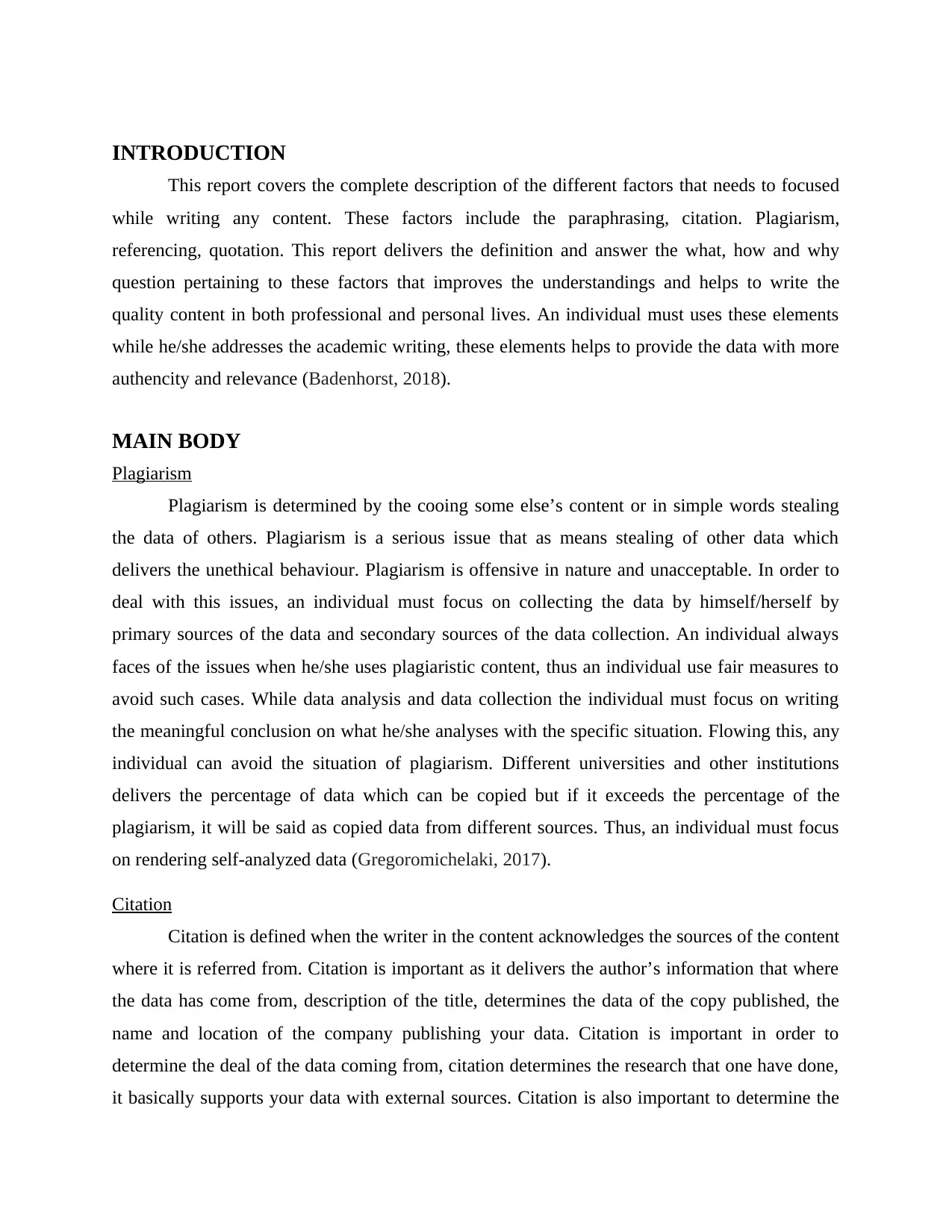
INTRODUCTION
This report covers the complete description of the different factors that needs to focused
while writing any content. These factors include the paraphrasing, citation. Plagiarism,
referencing, quotation. This report delivers the definition and answer the what, how and why
question pertaining to these factors that improves the understandings and helps to write the
quality content in both professional and personal lives. An individual must uses these elements
while he/she addresses the academic writing, these elements helps to provide the data with more
authencity and relevance (Badenhorst, 2018).
MAIN BODY
Plagiarism
Plagiarism is determined by the cooing some else’s content or in simple words stealing
the data of others. Plagiarism is a serious issue that as means stealing of other data which
delivers the unethical behaviour. Plagiarism is offensive in nature and unacceptable. In order to
deal with this issues, an individual must focus on collecting the data by himself/herself by
primary sources of the data and secondary sources of the data collection. An individual always
faces of the issues when he/she uses plagiaristic content, thus an individual use fair measures to
avoid such cases. While data analysis and data collection the individual must focus on writing
the meaningful conclusion on what he/she analyses with the specific situation. Flowing this, any
individual can avoid the situation of plagiarism. Different universities and other institutions
delivers the percentage of data which can be copied but if it exceeds the percentage of the
plagiarism, it will be said as copied data from different sources. Thus, an individual must focus
on rendering self-analyzed data (Gregoromichelaki, 2017).
Citation
Citation is defined when the writer in the content acknowledges the sources of the content
where it is referred from. Citation is important as it delivers the author’s information that where
the data has come from, description of the title, determines the data of the copy published, the
name and location of the company publishing your data. Citation is important in order to
determine the deal of the data coming from, citation determines the research that one have done,
it basically supports your data with external sources. Citation is also important to determine the
This report covers the complete description of the different factors that needs to focused
while writing any content. These factors include the paraphrasing, citation. Plagiarism,
referencing, quotation. This report delivers the definition and answer the what, how and why
question pertaining to these factors that improves the understandings and helps to write the
quality content in both professional and personal lives. An individual must uses these elements
while he/she addresses the academic writing, these elements helps to provide the data with more
authencity and relevance (Badenhorst, 2018).
MAIN BODY
Plagiarism
Plagiarism is determined by the cooing some else’s content or in simple words stealing
the data of others. Plagiarism is a serious issue that as means stealing of other data which
delivers the unethical behaviour. Plagiarism is offensive in nature and unacceptable. In order to
deal with this issues, an individual must focus on collecting the data by himself/herself by
primary sources of the data and secondary sources of the data collection. An individual always
faces of the issues when he/she uses plagiaristic content, thus an individual use fair measures to
avoid such cases. While data analysis and data collection the individual must focus on writing
the meaningful conclusion on what he/she analyses with the specific situation. Flowing this, any
individual can avoid the situation of plagiarism. Different universities and other institutions
delivers the percentage of data which can be copied but if it exceeds the percentage of the
plagiarism, it will be said as copied data from different sources. Thus, an individual must focus
on rendering self-analyzed data (Gregoromichelaki, 2017).
Citation
Citation is defined when the writer in the content acknowledges the sources of the content
where it is referred from. Citation is important as it delivers the author’s information that where
the data has come from, description of the title, determines the data of the copy published, the
name and location of the company publishing your data. Citation is important in order to
determine the deal of the data coming from, citation determines the research that one have done,
it basically supports your data with external sources. Citation is also important to determine the
⊘ This is a preview!⊘
Do you want full access?
Subscribe today to unlock all pages.

Trusted by 1+ million students worldwide
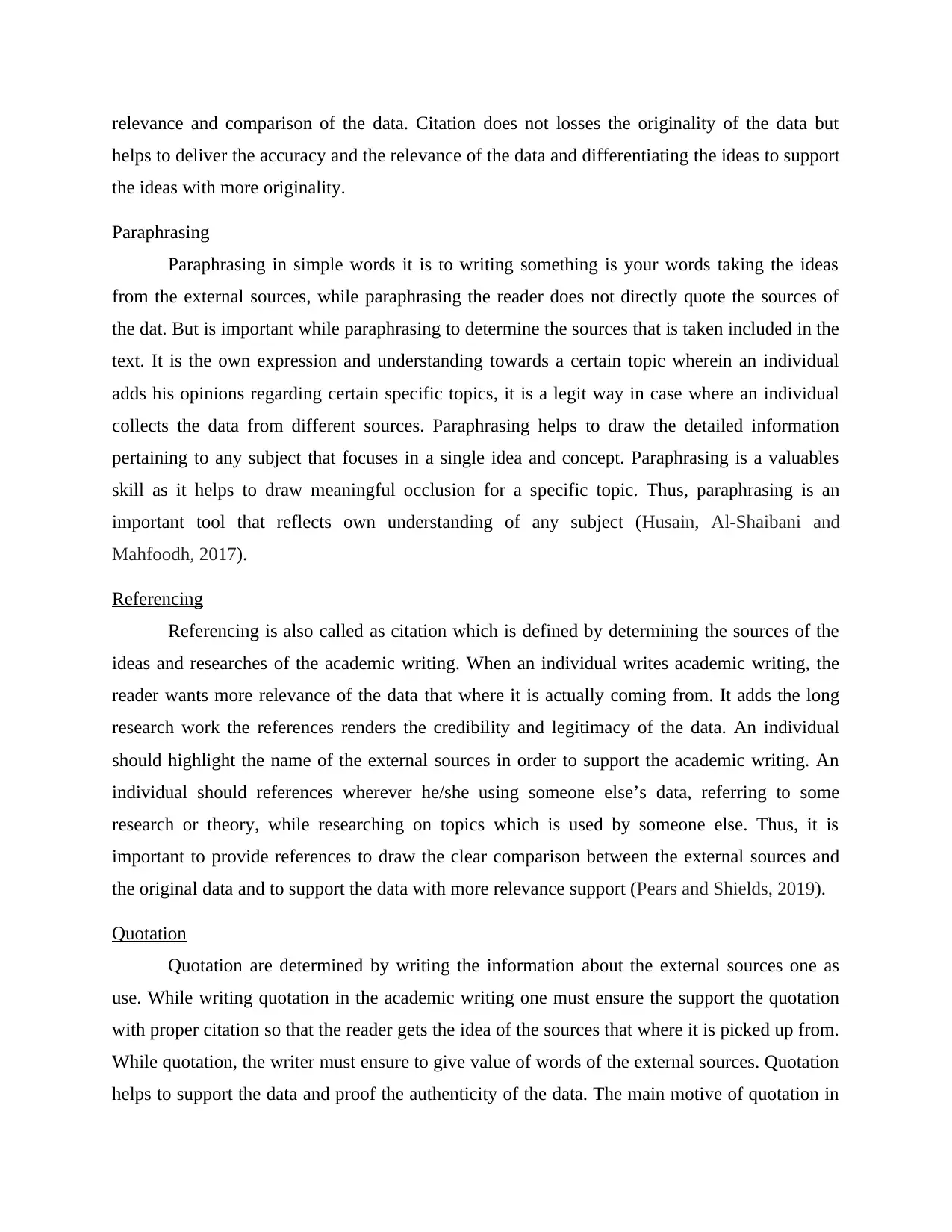
relevance and comparison of the data. Citation does not losses the originality of the data but
helps to deliver the accuracy and the relevance of the data and differentiating the ideas to support
the ideas with more originality.
Paraphrasing
Paraphrasing in simple words it is to writing something is your words taking the ideas
from the external sources, while paraphrasing the reader does not directly quote the sources of
the dat. But is important while paraphrasing to determine the sources that is taken included in the
text. It is the own expression and understanding towards a certain topic wherein an individual
adds his opinions regarding certain specific topics, it is a legit way in case where an individual
collects the data from different sources. Paraphrasing helps to draw the detailed information
pertaining to any subject that focuses in a single idea and concept. Paraphrasing is a valuables
skill as it helps to draw meaningful occlusion for a specific topic. Thus, paraphrasing is an
important tool that reflects own understanding of any subject (Husain, Al-Shaibani and
Mahfoodh, 2017).
Referencing
Referencing is also called as citation which is defined by determining the sources of the
ideas and researches of the academic writing. When an individual writes academic writing, the
reader wants more relevance of the data that where it is actually coming from. It adds the long
research work the references renders the credibility and legitimacy of the data. An individual
should highlight the name of the external sources in order to support the academic writing. An
individual should references wherever he/she using someone else’s data, referring to some
research or theory, while researching on topics which is used by someone else. Thus, it is
important to provide references to draw the clear comparison between the external sources and
the original data and to support the data with more relevance support (Pears and Shields, 2019).
Quotation
Quotation are determined by writing the information about the external sources one as
use. While writing quotation in the academic writing one must ensure the support the quotation
with proper citation so that the reader gets the idea of the sources that where it is picked up from.
While quotation, the writer must ensure to give value of words of the external sources. Quotation
helps to support the data and proof the authenticity of the data. The main motive of quotation in
helps to deliver the accuracy and the relevance of the data and differentiating the ideas to support
the ideas with more originality.
Paraphrasing
Paraphrasing in simple words it is to writing something is your words taking the ideas
from the external sources, while paraphrasing the reader does not directly quote the sources of
the dat. But is important while paraphrasing to determine the sources that is taken included in the
text. It is the own expression and understanding towards a certain topic wherein an individual
adds his opinions regarding certain specific topics, it is a legit way in case where an individual
collects the data from different sources. Paraphrasing helps to draw the detailed information
pertaining to any subject that focuses in a single idea and concept. Paraphrasing is a valuables
skill as it helps to draw meaningful occlusion for a specific topic. Thus, paraphrasing is an
important tool that reflects own understanding of any subject (Husain, Al-Shaibani and
Mahfoodh, 2017).
Referencing
Referencing is also called as citation which is defined by determining the sources of the
ideas and researches of the academic writing. When an individual writes academic writing, the
reader wants more relevance of the data that where it is actually coming from. It adds the long
research work the references renders the credibility and legitimacy of the data. An individual
should highlight the name of the external sources in order to support the academic writing. An
individual should references wherever he/she using someone else’s data, referring to some
research or theory, while researching on topics which is used by someone else. Thus, it is
important to provide references to draw the clear comparison between the external sources and
the original data and to support the data with more relevance support (Pears and Shields, 2019).
Quotation
Quotation are determined by writing the information about the external sources one as
use. While writing quotation in the academic writing one must ensure the support the quotation
with proper citation so that the reader gets the idea of the sources that where it is picked up from.
While quotation, the writer must ensure to give value of words of the external sources. Quotation
helps to support the data and proof the authenticity of the data. The main motive of quotation in
Paraphrase This Document
Need a fresh take? Get an instant paraphrase of this document with our AI Paraphraser
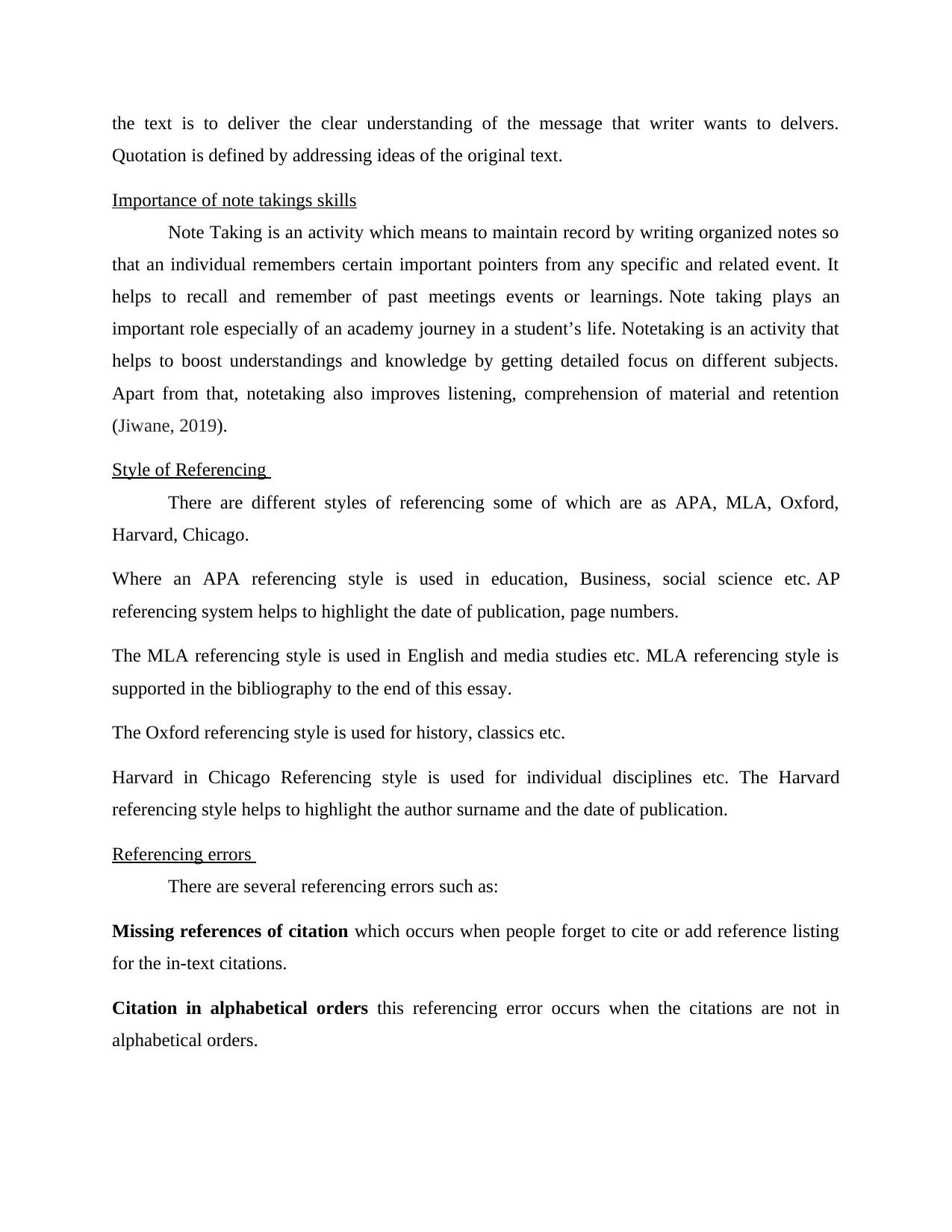
the text is to deliver the clear understanding of the message that writer wants to delvers.
Quotation is defined by addressing ideas of the original text.
Importance of note takings skills
Note Taking is an activity which means to maintain record by writing organized notes so
that an individual remembers certain important pointers from any specific and related event. It
helps to recall and remember of past meetings events or learnings. Note taking plays an
important role especially of an academy journey in a student’s life. Notetaking is an activity that
helps to boost understandings and knowledge by getting detailed focus on different subjects.
Apart from that, notetaking also improves listening, comprehension of material and retention
(Jiwane, 2019).
Style of Referencing
There are different styles of referencing some of which are as APA, MLA, Oxford,
Harvard, Chicago.
Where an APA referencing style is used in education, Business, social science etc. AP
referencing system helps to highlight the date of publication, page numbers.
The MLA referencing style is used in English and media studies etc. MLA referencing style is
supported in the bibliography to the end of this essay.
The Oxford referencing style is used for history, classics etc.
Harvard in Chicago Referencing style is used for individual disciplines etc. The Harvard
referencing style helps to highlight the author surname and the date of publication.
Referencing errors
There are several referencing errors such as:
Missing references of citation which occurs when people forget to cite or add reference listing
for the in-text citations.
Citation in alphabetical orders this referencing error occurs when the citations are not in
alphabetical orders.
Quotation is defined by addressing ideas of the original text.
Importance of note takings skills
Note Taking is an activity which means to maintain record by writing organized notes so
that an individual remembers certain important pointers from any specific and related event. It
helps to recall and remember of past meetings events or learnings. Note taking plays an
important role especially of an academy journey in a student’s life. Notetaking is an activity that
helps to boost understandings and knowledge by getting detailed focus on different subjects.
Apart from that, notetaking also improves listening, comprehension of material and retention
(Jiwane, 2019).
Style of Referencing
There are different styles of referencing some of which are as APA, MLA, Oxford,
Harvard, Chicago.
Where an APA referencing style is used in education, Business, social science etc. AP
referencing system helps to highlight the date of publication, page numbers.
The MLA referencing style is used in English and media studies etc. MLA referencing style is
supported in the bibliography to the end of this essay.
The Oxford referencing style is used for history, classics etc.
Harvard in Chicago Referencing style is used for individual disciplines etc. The Harvard
referencing style helps to highlight the author surname and the date of publication.
Referencing errors
There are several referencing errors such as:
Missing references of citation which occurs when people forget to cite or add reference listing
for the in-text citations.
Citation in alphabetical orders this referencing error occurs when the citations are not in
alphabetical orders.
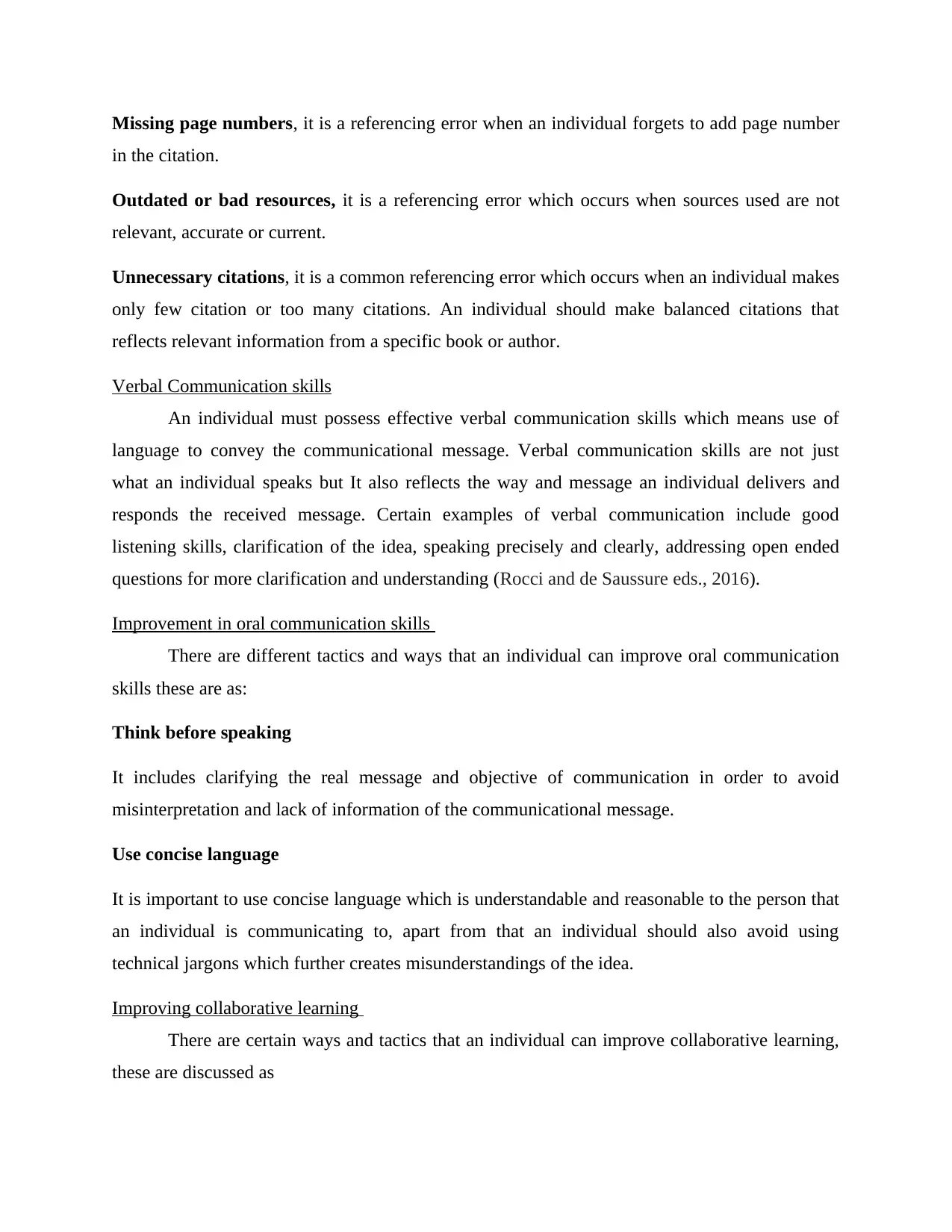
Missing page numbers, it is a referencing error when an individual forgets to add page number
in the citation.
Outdated or bad resources, it is a referencing error which occurs when sources used are not
relevant, accurate or current.
Unnecessary citations, it is a common referencing error which occurs when an individual makes
only few citation or too many citations. An individual should make balanced citations that
reflects relevant information from a specific book or author.
Verbal Communication skills
An individual must possess effective verbal communication skills which means use of
language to convey the communicational message. Verbal communication skills are not just
what an individual speaks but It also reflects the way and message an individual delivers and
responds the received message. Certain examples of verbal communication include good
listening skills, clarification of the idea, speaking precisely and clearly, addressing open ended
questions for more clarification and understanding (Rocci and de Saussure eds., 2016).
Improvement in oral communication skills
There are different tactics and ways that an individual can improve oral communication
skills these are as:
Think before speaking
It includes clarifying the real message and objective of communication in order to avoid
misinterpretation and lack of information of the communicational message.
Use concise language
It is important to use concise language which is understandable and reasonable to the person that
an individual is communicating to, apart from that an individual should also avoid using
technical jargons which further creates misunderstandings of the idea.
Improving collaborative learning
There are certain ways and tactics that an individual can improve collaborative learning,
these are discussed as
in the citation.
Outdated or bad resources, it is a referencing error which occurs when sources used are not
relevant, accurate or current.
Unnecessary citations, it is a common referencing error which occurs when an individual makes
only few citation or too many citations. An individual should make balanced citations that
reflects relevant information from a specific book or author.
Verbal Communication skills
An individual must possess effective verbal communication skills which means use of
language to convey the communicational message. Verbal communication skills are not just
what an individual speaks but It also reflects the way and message an individual delivers and
responds the received message. Certain examples of verbal communication include good
listening skills, clarification of the idea, speaking precisely and clearly, addressing open ended
questions for more clarification and understanding (Rocci and de Saussure eds., 2016).
Improvement in oral communication skills
There are different tactics and ways that an individual can improve oral communication
skills these are as:
Think before speaking
It includes clarifying the real message and objective of communication in order to avoid
misinterpretation and lack of information of the communicational message.
Use concise language
It is important to use concise language which is understandable and reasonable to the person that
an individual is communicating to, apart from that an individual should also avoid using
technical jargons which further creates misunderstandings of the idea.
Improving collaborative learning
There are certain ways and tactics that an individual can improve collaborative learning,
these are discussed as
⊘ This is a preview!⊘
Do you want full access?
Subscribe today to unlock all pages.

Trusted by 1+ million students worldwide
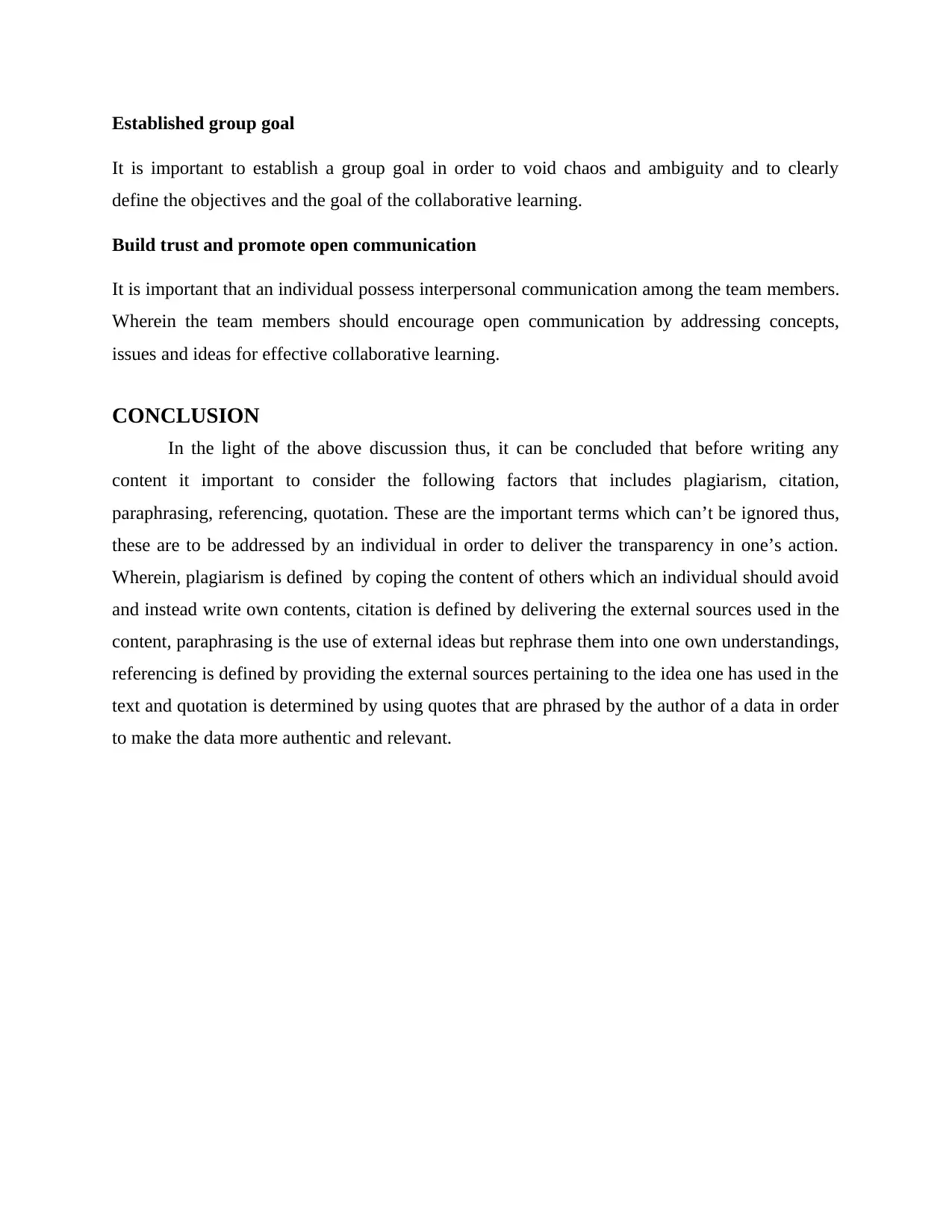
Established group goal
It is important to establish a group goal in order to void chaos and ambiguity and to clearly
define the objectives and the goal of the collaborative learning.
Build trust and promote open communication
It is important that an individual possess interpersonal communication among the team members.
Wherein the team members should encourage open communication by addressing concepts,
issues and ideas for effective collaborative learning.
CONCLUSION
In the light of the above discussion thus, it can be concluded that before writing any
content it important to consider the following factors that includes plagiarism, citation,
paraphrasing, referencing, quotation. These are the important terms which can’t be ignored thus,
these are to be addressed by an individual in order to deliver the transparency in one’s action.
Wherein, plagiarism is defined by coping the content of others which an individual should avoid
and instead write own contents, citation is defined by delivering the external sources used in the
content, paraphrasing is the use of external ideas but rephrase them into one own understandings,
referencing is defined by providing the external sources pertaining to the idea one has used in the
text and quotation is determined by using quotes that are phrased by the author of a data in order
to make the data more authentic and relevant.
It is important to establish a group goal in order to void chaos and ambiguity and to clearly
define the objectives and the goal of the collaborative learning.
Build trust and promote open communication
It is important that an individual possess interpersonal communication among the team members.
Wherein the team members should encourage open communication by addressing concepts,
issues and ideas for effective collaborative learning.
CONCLUSION
In the light of the above discussion thus, it can be concluded that before writing any
content it important to consider the following factors that includes plagiarism, citation,
paraphrasing, referencing, quotation. These are the important terms which can’t be ignored thus,
these are to be addressed by an individual in order to deliver the transparency in one’s action.
Wherein, plagiarism is defined by coping the content of others which an individual should avoid
and instead write own contents, citation is defined by delivering the external sources used in the
content, paraphrasing is the use of external ideas but rephrase them into one own understandings,
referencing is defined by providing the external sources pertaining to the idea one has used in the
text and quotation is determined by using quotes that are phrased by the author of a data in order
to make the data more authentic and relevant.
Paraphrase This Document
Need a fresh take? Get an instant paraphrase of this document with our AI Paraphraser
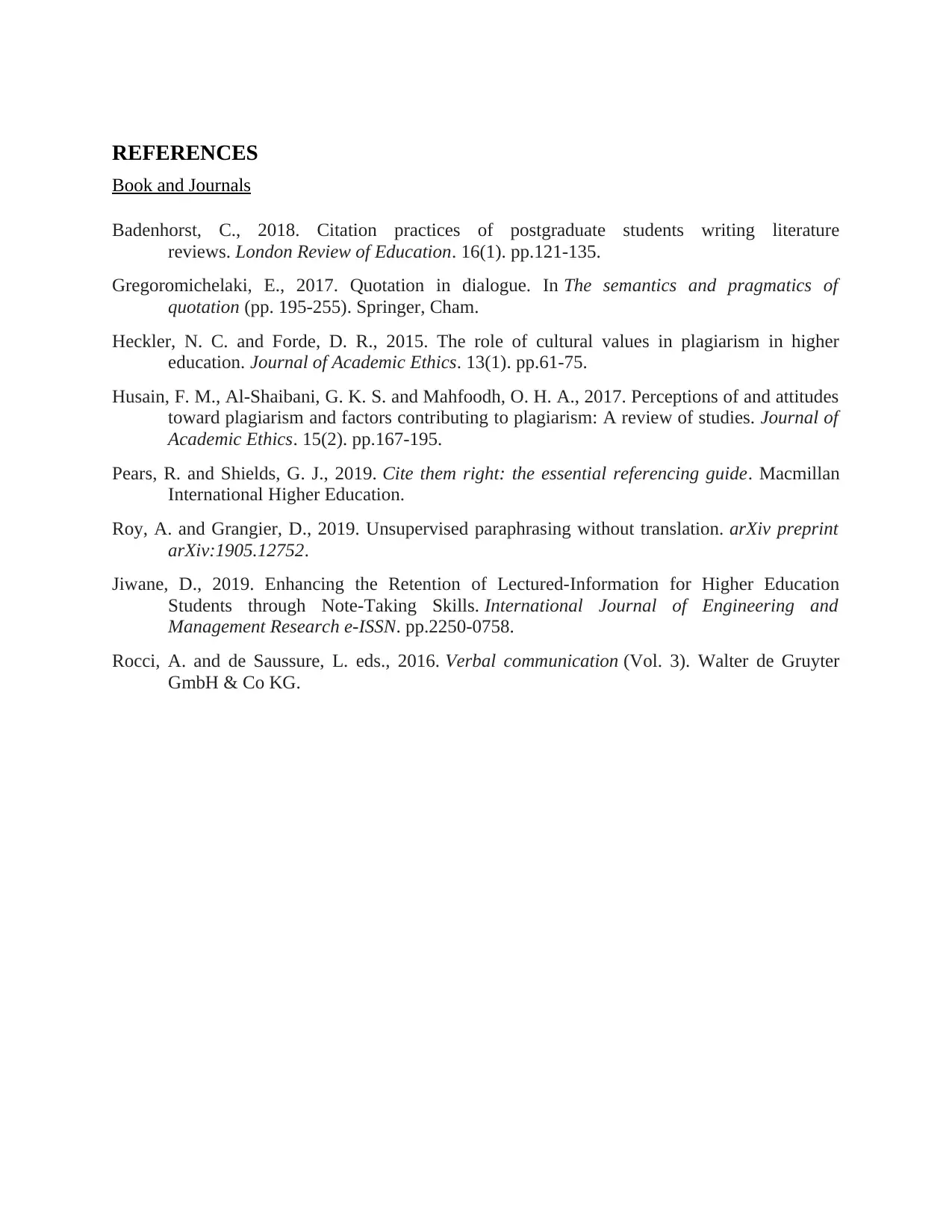
REFERENCES
Book and Journals
Badenhorst, C., 2018. Citation practices of postgraduate students writing literature
reviews. London Review of Education. 16(1). pp.121-135.
Gregoromichelaki, E., 2017. Quotation in dialogue. In The semantics and pragmatics of
quotation (pp. 195-255). Springer, Cham.
Heckler, N. C. and Forde, D. R., 2015. The role of cultural values in plagiarism in higher
education. Journal of Academic Ethics. 13(1). pp.61-75.
Husain, F. M., Al-Shaibani, G. K. S. and Mahfoodh, O. H. A., 2017. Perceptions of and attitudes
toward plagiarism and factors contributing to plagiarism: A review of studies. Journal of
Academic Ethics. 15(2). pp.167-195.
Pears, R. and Shields, G. J., 2019. Cite them right: the essential referencing guide. Macmillan
International Higher Education.
Roy, A. and Grangier, D., 2019. Unsupervised paraphrasing without translation. arXiv preprint
arXiv:1905.12752.
Jiwane, D., 2019. Enhancing the Retention of Lectured-Information for Higher Education
Students through Note-Taking Skills. International Journal of Engineering and
Management Research e-ISSN. pp.2250-0758.
Rocci, A. and de Saussure, L. eds., 2016. Verbal communication (Vol. 3). Walter de Gruyter
GmbH & Co KG.
Book and Journals
Badenhorst, C., 2018. Citation practices of postgraduate students writing literature
reviews. London Review of Education. 16(1). pp.121-135.
Gregoromichelaki, E., 2017. Quotation in dialogue. In The semantics and pragmatics of
quotation (pp. 195-255). Springer, Cham.
Heckler, N. C. and Forde, D. R., 2015. The role of cultural values in plagiarism in higher
education. Journal of Academic Ethics. 13(1). pp.61-75.
Husain, F. M., Al-Shaibani, G. K. S. and Mahfoodh, O. H. A., 2017. Perceptions of and attitudes
toward plagiarism and factors contributing to plagiarism: A review of studies. Journal of
Academic Ethics. 15(2). pp.167-195.
Pears, R. and Shields, G. J., 2019. Cite them right: the essential referencing guide. Macmillan
International Higher Education.
Roy, A. and Grangier, D., 2019. Unsupervised paraphrasing without translation. arXiv preprint
arXiv:1905.12752.
Jiwane, D., 2019. Enhancing the Retention of Lectured-Information for Higher Education
Students through Note-Taking Skills. International Journal of Engineering and
Management Research e-ISSN. pp.2250-0758.
Rocci, A. and de Saussure, L. eds., 2016. Verbal communication (Vol. 3). Walter de Gruyter
GmbH & Co KG.
1 out of 8
Related Documents
Your All-in-One AI-Powered Toolkit for Academic Success.
+13062052269
info@desklib.com
Available 24*7 on WhatsApp / Email
![[object Object]](/_next/static/media/star-bottom.7253800d.svg)
Unlock your academic potential
Copyright © 2020–2026 A2Z Services. All Rights Reserved. Developed and managed by ZUCOL.




